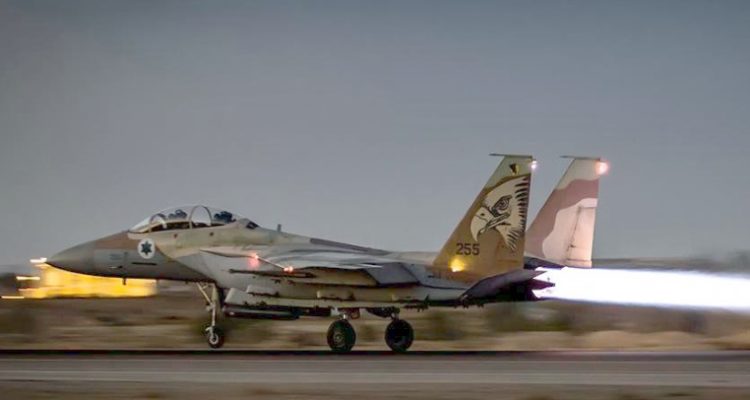In a failed assault, Iran attacked Israel directly for the first time in history. The Israel Air Force responded by bombing dozens of Iranian targets in Syria, the largest such operation in decades.
By: Aryeh Savir, World Israel News
Iran’s Quds forces launched a barrage of rockets at IDF bases on the Golan Heights in northern Israel on Wednesday night, the first Iranian attack on Israeli soil in history. The assault prompted an extensive Israel Air Force (IAF) attack on dozens of Iranian targets in Syria.
Shortly after midnight, IDF defense systems identified approximately 20 rockets that the Iranian Quds forces had launched at IDF forward posts on the Golan Heights. The majority of the rockets missed their mark and fell in Syria territory, while four were intercepted by the Iron Dome missile defense system.
The incoming attack set off air raid sirens in communities throughout the north.
The Iranian attack caused no injuries or damage and was essentially a resounding failure.
In response to Iran’s attack on Israeli sovereignty, IAF fighter jets struck dozens of military targets belonging to the Iranian Quds forces in Syrian territory.
As part of the wide-scale attack, said to be the largest in decades and possibly since the 1973 Yom Kippur War, the IAF struck Quds Force intelligence centers, Quds Force logistical command centers, a Quds Force military center and a Quds Force logistical center in Al-Kiswah, as well as an Iranian military base north of Damascus.
Additional targets included Quds Force ammunition depots in the Damascus International Airport, intelligence systems and outposts associated with the Quds Force, watchtowers, military posts and munitions in the buffer zone.
In addition, the Iranian missile launcher responsible for the missiles fired on Israeli territory was destroyed.
Stern warning to Syria
During the attacks, Israel issued a direct and stern warning to the Syrian army not to get involved in the confrontation, but the Syrian air defense did attempt to down IAF fighters.
The Syrian army claimed its air defenses “repelled an Israeli missile aggression on Syrian territories, shooting down scores of missiles.”
A military source quoted by Syria’s official SANA news said the army’s air defenses shot down “tens of Israeli missiles, preventing most of them from reaching their targets,” while some managed to hit a number of air defense battalions, radars and an ammunitions depot.
In response to the Syrian intervention, the IAF attacked a number of Syrian aerial interception systems, including SA-5, SA-17, SA-22, SA-2 batteries.
The Syrian Observatory for Human Rights reported several explosions that rocked the central sector of Al-Quneitra countryside, adjacent to the Israeli Golan Heights, the result of an Israeli attack on positions of the Assad regime army and its “allies” near al-Baath city.
All IAF aircraft returned to their airbases safely.
There was no immediate word on Iranian casualties, and the Iranian media has so far remained silent on the hostilities.
“The Iranian attack on Israel tonight is more decisive proof of the intention behind the Iranian military establishment in Syria and the danger it poses on Israel and stability in the region,” the IDF stated. “The IDF will not allow the Iranian threat to establish itself in Syria. The Syrian regime will be held accountable for everything happening in its territory.”
The IDF vowed to “continue to operate in a determinate matter in opposition to the Iranian military establishment in Syria. The IDF holds the Syrian regime responsible for the actions performed in its territory and warns it against taking action. The IDF is highly prepared for various scenarios and will continue to do whatever it takes to ensure the safety of Israel’s civilians.”
IDF remains on ‘very high alert’
Just hours after the violent confrontation, Israel’s home front is in routine activity, with school and agricultural work proceeding as usual.
IDF spokesman Lt. Col. Jonathan Conricus stated that Israel was not looking to escalate the situation, however, the army remains on “very high alert,” and “should there be another Iranian attack, we will be prepared for it.”
Israel has repeatedly warned that it will not accept an Iranian military presence in Syria, which it views as a direct threat to its security.
The IDF has been anticipating such an act of aggression from Iran, and on the previous night it carried out a preemptive strike against Iranian missiles that were pointed towards Israel. The IDF considers its action on Wednesday night as highly successful, while the Iranian attack is viewed as a total failure.





